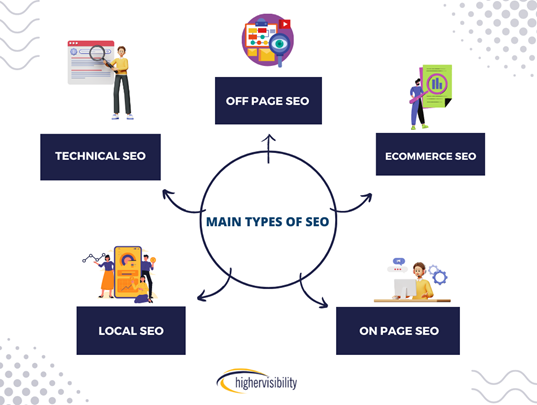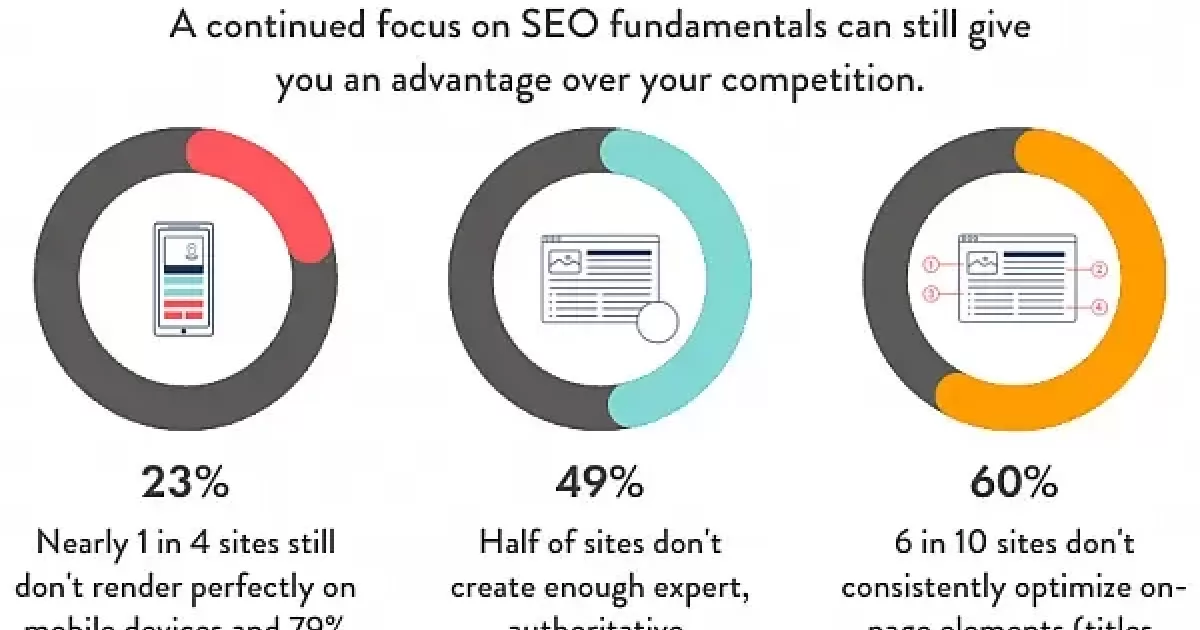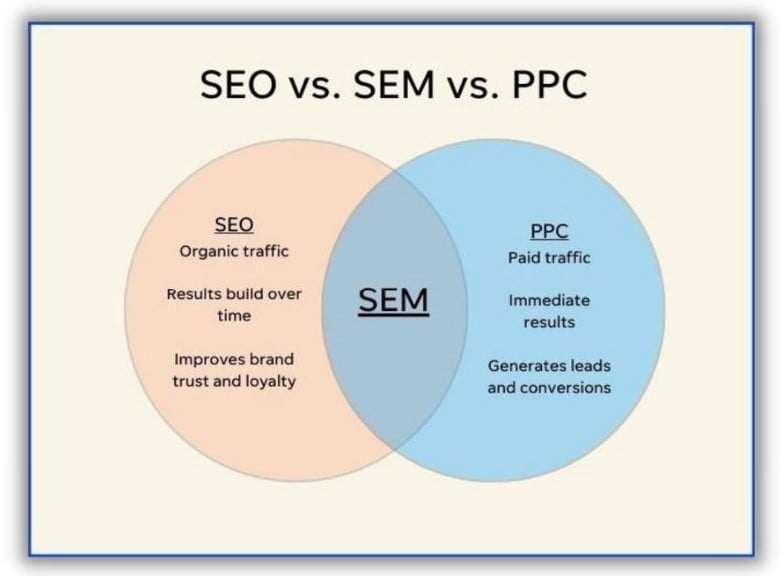Discover the untold truths about SEO vs Local SEO and how harnessing their unique powers can skyrocket your online presence.

Image courtesy of via DALL-E 3
Table of Contents
Introduction to SEO and Local SEO
In the vast landscape of the internet, websites strive to stand out and attract visitors. But how do they do that? This is where SEO and Local SEO come into play. SEO, which stands for Search Engine Optimization, and Local SEO are essential tools that help websites climb the ranks of search engines like Google. Let’s delve into what these terms mean and why they are crucial for websites.
What is SEO?
SEO, or Search Engine Optimization, is like a magic potion that helps websites appear higher on search engine results pages. Imagine you’re searching for your favorite ice cream flavor online. Without SEO, your go-to ice cream shop’s website might not even show up in the results. SEO works behind the scenes by using specific keywords and crafting quality content to tell search engines, “Hey, this website has what the user is looking for!”
What is Local SEO?
Now, let’s talk about Local SEO. Local SEO is like a digital compass for local businesses. It helps them be found by people in their area looking for products or services they offer. Picture this: you’re craving a cheeseburger and search for “best cheeseburger near me.” Local SEO ensures that nearby burger joints pop up in your search results, making it easier for you to satisfy your hunger.
Why Are They Important?
SEO and Local SEO are essential because they act as guiding stars for websites and businesses in the vast online galaxy. They help websites attract more visitors, increase their visibility, and ultimately grow their online presence. Without SEO and Local SEO, websites might get lost in the digital wilderness, making it harder for people to discover them. By focusing on these strategies, websites can shine brighter and reach a broader audience.
Keywords and Their Role
Keywords are like clues that help search engines understand what a webpage is about. When someone searches for something on the internet, they type in certain words or phrases that are related to what they are looking for. These words are the keywords. For example, if someone is searching for “best pizza in town,” the keywords would be “best pizza” and “town.”
Creating Quality Content
Quality content is like the heart of a webpage. It includes all the information, images, and videos that people see when they visit a website. Search engines love websites that have useful and relevant content because it helps them provide the best results to searchers. So, if a webpage has well-written articles, helpful videos, and engaging images, it is more likely to rank higher on search engine results pages.
Search Engine Results Pages (SERPs)
Search Engine Results Pages (SERPs) are like the final destination where all the websites that match a searcher’s query are displayed. When someone searches for something on Google, for example, the search engine shows a list of websites that it thinks best matches the search terms. SEO plays a crucial role in determining where a website appears on these results pages. By using the right keywords and creating quality content, websites can improve their chances of appearing higher in the search results and attracting more visitors.
How Local SEO Works
Google My Business is a powerful tool for local businesses to improve their visibility in local search results. By creating and optimizing a Google My Business account, businesses can provide essential information such as their address, phone number, business hours, and website. This helps Google understand the business better and increases the chances of appearing in relevant local searches.
Local Keywords
Local keywords are specific terms that include location-based phrases to target nearby customers effectively. By incorporating local keywords in website content, meta tags, and business listings, businesses can attract local search traffic and improve their local SEO rankings. For example, using phrases like “best coffee shop in downtown” helps businesses connect with customers searching for coffee shops in that specific area.
Importance of NAP
In Local SEO, having accurate and consistent NAP (Name, Address, Phone Number) information across all online platforms is crucial. This information serves as identifiers for search engines to associate with a particular business. Inaccurate or inconsistent NAP details can lead to confusion among search engines and potential customers, ultimately impacting a business’s local search visibility. By ensuring that NAP information is uniform and updated, businesses can boost their local SEO efforts and attract more local customers.
Differences Between SEO and Local SEO
SEO, or Search Engine Optimization, aims to reach a broad audience on a global scale. It focuses on optimizing websites to rank higher in search engine results pages for relevant keywords. Local SEO, on the other hand, targets a specific local audience. It helps businesses attract nearby customers by appearing in local search results related to their geographical location.

Image courtesy of www.highervisibility.com via Google Images
Strategy Differences
In SEO, the strategies often involve creating high-quality content, building backlinks, and optimizing on-page elements like meta tags and headings. Local SEO strategies, however, revolve around maintaining consistent NAP (Name, Address, Phone Number) details across online directories, acquiring local backlinks, and managing business listings on platforms like Google My Business.
Goals and Objectives
The primary goal of SEO is to increase website visibility and drive organic traffic from search engines. It aims to improve overall website performance and reach a global audience. Conversely, Local SEO focuses on improving local visibility for businesses, increasing foot traffic to physical locations, and enhancing brand awareness within a specific geographic area.
Tools for SEO
Keyword research tools are essential for identifying the right words and phrases to target in your content. These tools help you understand what people are searching for and how competitive certain keywords are. By using keyword research tools, you can optimize your website to attract more visitors from search engines.
Content Optimization Tools
Content optimization tools help you enhance your website content to make it more appealing to search engines. These tools analyze your text for factors like keyword density, readability, and relevance. By improving your content with these tools, you can increase your chances of ranking higher in search engine results.
Analytics Tools
Analytics tools provide valuable insights into your website’s performance and user behavior. By tracking metrics like traffic sources, bounce rates, and conversion rates, you can measure the effectiveness of your SEO efforts. These tools help you make informed decisions to improve your website’s visibility and engagement.
Tools for Local SEO
When it comes to Local SEO, utilizing the right tools can make a significant impact on your business’s online visibility. Let’s explore some key tools that can help enhance your local search rankings and attract more customers to your doorstep.

Image courtesy of www.workshopdigital.com via Google Images
Business Listing Tools
Business listing tools play a crucial role in managing and optimizing your business information across various online directories. By ensuring that your business details are accurate and consistent across different platforms, you can improve your local search visibility and credibility. Tools like Moz Local and Yext can help streamline this process by automatically updating your information across multiple directories, saving you time and ensuring accuracy.
Review Management Tools
Online reviews are essential for building trust with potential customers and influencing their purchasing decisions. Review management tools like BrightLocal and Reputation.com can help you monitor and respond to customer reviews across different platforms. By actively engaging with reviews, you can demonstrate your commitment to customer satisfaction and address any concerns promptly, enhancing your business’s reputation in the local community.
Citation Tools
Citations, which are mentions of your business name, address, and phone number (NAP) on other websites, play a crucial role in establishing your business’s credibility and authority in local search. Citation tools like Whitespark and Synup can help you build and manage citations effectively, ensuring that your business information is consistently listed across the web. By optimizing your citations, you can improve your local search rankings and make it easier for customers to find and contact your business.
Common Mistakes in SEO
When implementing SEO strategies, it’s crucial to steer clear of common mistakes that can hinder your website’s performance. By avoiding these errors, you can enhance your chances of ranking higher on search engine results pages and attracting more visitors to your site.
Keyword Stuffing
Keyword stuffing refers to the practice of excessively using keywords in a webpage’s content in an attempt to manipulate search engine rankings. Instead of improving SEO, this tactic can actually backfire, as search engines penalize websites for keyword stuffing. It’s essential to use keywords naturally and strategically within your content to ensure a positive impact on your SEO efforts.
Duplicate Content
Duplicate content occurs when identical or very similar content exists on multiple webpages, either within the same site or across different sites. Search engines strive to provide users with unique and valuable content, so they may penalize websites with duplicate content by lowering their rankings. To avoid this issue, create original and engaging content for each page on your site.
Ignoring Mobile Optimization
In today’s mobile-centric world, neglecting to optimize your website for mobile devices can significantly harm your SEO performance. Search engines prioritize mobile-friendly websites when determining rankings, so it’s essential to ensure that your site displays properly and functions seamlessly on smartphones and tablets. By focusing on mobile optimization, you can improve user experience and boost your SEO success.
Inconsistent NAP Information
In Local SEO, having consistent Name, Address, and Phone Number (NAP) information across various online platforms is crucial. When businesses have different contact details listed on different sites, it confuses search engines and can negatively impact local search rankings. For example, if your business address is listed as “123 Main Street” on your website but as “456 Elm Avenue” on Google My Business, this inconsistency can lead to confusion and potentially reduce your visibility in local search results.
Ignoring Customer Reviews
Customer reviews play a significant role in Local SEO. Ignoring or neglecting customer reviews can harm your online reputation and ultimately impact your search engine rankings. Positive reviews not only increase your credibility with potential customers but also contribute to higher visibility in local search. Responding to reviews, whether positive or negative, shows that you value customer feedback and are actively engaging with your audience, which can boost your local search performance.
Lack of Local Backlinks
Local backlinks are links from other websites that point back to your site and are essential for Local SEO. These links help search engines understand the relevance and authority of your business within a specific geographic area. Without local backlinks, your website may struggle to rank well in local search results. Building relationships with local organizations, sponsoring community events, or participating in local partnerships are effective ways to acquire local backlinks and strengthen your site’s credibility in local search.
Conclusion
In conclusion, both SEO and Local SEO play crucial roles in helping websites and businesses improve their online visibility and attract more visitors. SEO focuses on optimizing websites to rank higher in search engine results, while Local SEO targets local searches to connect businesses with nearby customers. Understanding and implementing both strategies can significantly improve a website’s performance and increase its chances of success in the competitive online landscape.

Image courtesy of www.wordstream.com via Google Images
Throughout this article, we have delved into the key differences between SEO and Local SEO, emphasizing their unique goals, strategies, and target audiences. By recognizing these disparities and tailoring efforts accordingly, website owners and business operators can maximize their online presence and reach a broader audience.
Remember, whether you are looking to improve your website’s global visibility with SEO or enhance your local outreach with Local SEO, both approaches are essential for achieving sustainable growth and success in the digital realm. By incorporating the best practices and tools discussed in this article, you can optimize your online presence, attract more visitors, and ultimately improve your business’s performance.
Frequently Asked Questions (FAQs)
What is the main difference between SEO and Local SEO?
SEO, or Search Engine Optimization, focuses on improving a website’s visibility and rankings on search engines in general. It involves using keywords and optimizing content to attract a broader online audience. Local SEO, on the other hand, is targeted towards local businesses trying to reach customers in their specific geographical area. It emphasizes location-based keywords, managing business listings, and acquiring reviews from local customers.
Can I use the same strategies for both SEO and Local SEO?
While there are similarities in the strategies used for SEO and Local SEO, such as keyword optimization and content quality, there are also distinct differences. For Local SEO, businesses need to focus more on location-specific keywords, optimizing Google My Business listings, and managing local citations and reviews. Tailoring strategies to meet the specific needs of each type of optimization is crucial for the best results.
Why is Local SEO important for small businesses?
Local SEO is essential for small businesses because it helps them target local customers who are actively searching for products or services in their area. By optimizing for local search, small businesses can increase their online visibility, attract nearby customers, and compete more effectively with larger businesses. It’s a cost-effective way to reach a highly targeted audience and drive foot traffic to physical locations.







